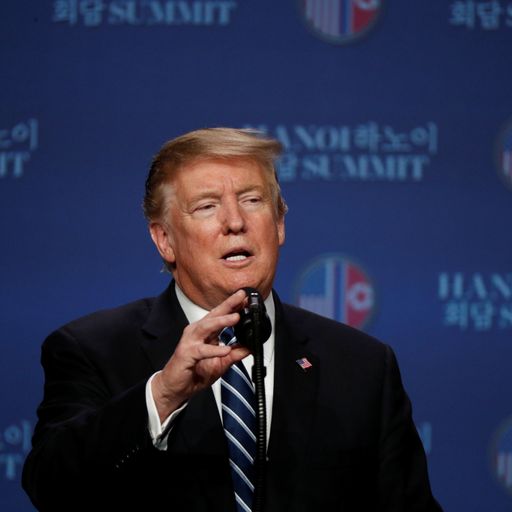Hanoi summit was a failure of planning and negotiations
Relying on personal chemistry to bridge the gap in expectations between the US and North Korea was a mistake.
Friday 1 March 2019 00:31, UK
Forgive me if you've heard this one before: no deal is better than a bad deal - that was Donald Trump's line at a fairly extraordinary press conference.
It was remarkable how quickly things fell apart in Hanoi. Reporters here had been given a schedule for the joint signing of an agreement between Kim Jong Un and Mr Trump. We'd even been told the menu for their working lunch.
Then, suddenly, lunch was cancelled - perhaps Kim Jong Un will now never know the delights of Banoffee pie, explained by the White House as a "British pie" - and so was the signing.
Instead, we rushed for an early press conference at Mr Trump's hotel.
When the US president appeared behind the lectern, with US Secretary of State Mike Pompeo, he looked remarkably at ease.
Walking away had not been an act of rancour or spite: Kim Jong Un was "quite a guy" - "quite a character", he said.
The bromance clearly endures, to the extent that Mr Trump was happy to take Mr Kim's word that the dictator had not known or had anything to do with Otto Warmbier, the American citizen put in a North Korean prison and returned to the US in a coma, and that he would not launch any missile tests.
We should be grateful that personal relations appear to remain good: a return to missile testing would lead to an extremely dangerous situation on the Korean Peninsula.
Nor will either leader return home with too much egg on their face. They can both tell their domestic audiences (and remember that Kim Jong Un has perhaps an even bigger job to convince the North Korean elites of his diplomatic approach) that what was on offer wasn't good enough, that they would not give concessions on the cheap.
On balance, the outcome probably favours the US and Mr Trump slightly. So long as no missile or nuclear tests take place, the situation is the same as before: de facto recognition and containment of North Korea as a nuclear power.
North Korea may produce more nuclear weapons, more missiles, but an extra 20 warheads doesn't really change the weight of the nuclear deterrent: the warheads they have are already enough.
The North Korean leader does want relief from sanctions, though. He may now go to China and its president Xi Jinping: his extremely slow train will pass through Beijing on his way back home.
But China is close to striking a trade deal with the US and will be less inclined to help than it might have been even a few months ago.
And there is pressure for Kim. He is unlikely to encounter a US president as well disposed to him as Donald Trump. And Mr Trump won't be around for ever - perhaps not very long at all - so Kim needs to extract concrete concessions while he can.
If that's the detailed calculus, the big picture, for both sides, is that this summit was a failure - of planning and of negotiations.
A deal should have been much closer before Mr Kim and Mr Trump got here. Relying on personal chemistry to bridge the gap in expectations turned out to be a mistake.
We have been told often enough that this is summit-driven diplomacy. Where does that leave us, though, when the summit doesn't drive diplomacy?







